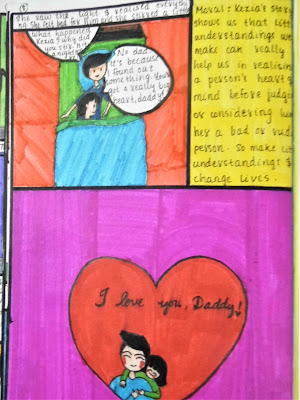The Little Girl
The Little Girl is a short story by Katherine Mansfield given in the class 9 English course of NCERT. Maggie gave an assignment to her students based on the story and one of her students, Athena Baby Sabu, presented a brilliant job. She converted the story into a delightful comic strip.
Mansfield tells the story of Kezia who is the eponymous little girl. Kezia is scared of her father who wields a lot of control on the entire family. She is punished severely for an unwitting mistake which makes her even more scared of her father. Her grandmother is fond of her and is her emotional succour.
The grandmother is away from home one day with Kezia's mother who is hospitalised. Kezia gets her usual nightmare and is terrified. There is no one at home to console her except her father from whom she does not expect any consolation. But the father rises to the occasion and lets the little girl sleep beside him that night. She rests her head on her father's chest and can feel his heartbeats. "What a big heart you've got, Father dear," she tells her father.
Let me present Athena's work below which speaks eloquently for itself.
xZx
Mansfield tells the story of Kezia who is the eponymous little girl. Kezia is scared of her father who wields a lot of control on the entire family. She is punished severely for an unwitting mistake which makes her even more scared of her father. Her grandmother is fond of her and is her emotional succour.
The grandmother is away from home one day with Kezia's mother who is hospitalised. Kezia gets her usual nightmare and is terrified. There is no one at home to console her except her father from whom she does not expect any consolation. But the father rises to the occasion and lets the little girl sleep beside him that night. She rests her head on her father's chest and can feel his heartbeats. "What a big heart you've got, Father dear," she tells her father.
Let me present Athena's work below which speaks eloquently for itself.
 |
| Athena Baby Sabu |
xZx










It reminds me of my childhood. Nice post
ReplyDeleteLooks like an interesting read for kids, will check out. Looks like the pictures are self drawn and painted, good job done #vartikasdiaryreading #myfriendalexa
ReplyDeleteBrilliant job .
ReplyDeleteIt was very useful for me , I was having a activity to make a comic I was just thrilled to see this . It's awesome work 😊
ReplyDeletethe comic form of the little girl was amazingly represented it also helped me for my activity. I was very glad to be able to find your comic...thank you so much for your post.
ReplyDeleteVery helpful
ReplyDeleteNeat and nice work
Thank you ❤️ helped a lott
Thank you so much for uploading this it's very helpful very neat and nice work ❤️
ReplyDeleteVery very very nice and excellent
ReplyDeletereally really good job by Athena. what a talent! kudos to her!
ReplyDeleteIt was very useful for me , it helped me in making my comic strip holiday homework. Thank you !
ReplyDeleteI have never seen such a super work .super
ReplyDeleteThank you for helping me in my home work
ReplyDeleteThank you for sharing this informative post! It's always great to come across quality content like this. The insights you've provided are valuable and will be helpful for anyone interested in this topic. Keep up the good work!
ReplyDeleteLPlanet Relationships
ReplyDeleteThank you for keeping us informed. The blog posts are always engaging and full of useful information.
ReplyDeletehttps://bvwschool.com/draw-watercolor-painting-easy-for-beginners/
Photos are not clear 😔
ReplyDeleteSuch ma yehh short summary mera bauth kam aaya
ReplyDeleteFabulous 🤩
ReplyDelete
ReplyDeleteFantastic post! I truly enjoyed reading it. The insights you provided were not only informative but also engaging. Discover the best NGO in India for community
empowerment. Kotik Foundation near me offers impactful programs that make a real difference. Join us for positive change and be part of something meaningful. Keep
up the excellent work—I can’t wait to read more of your future posts!